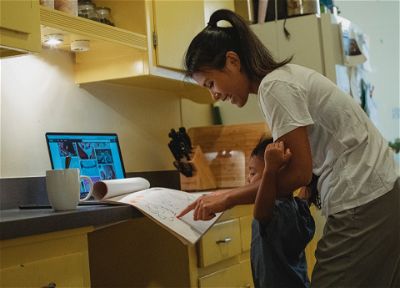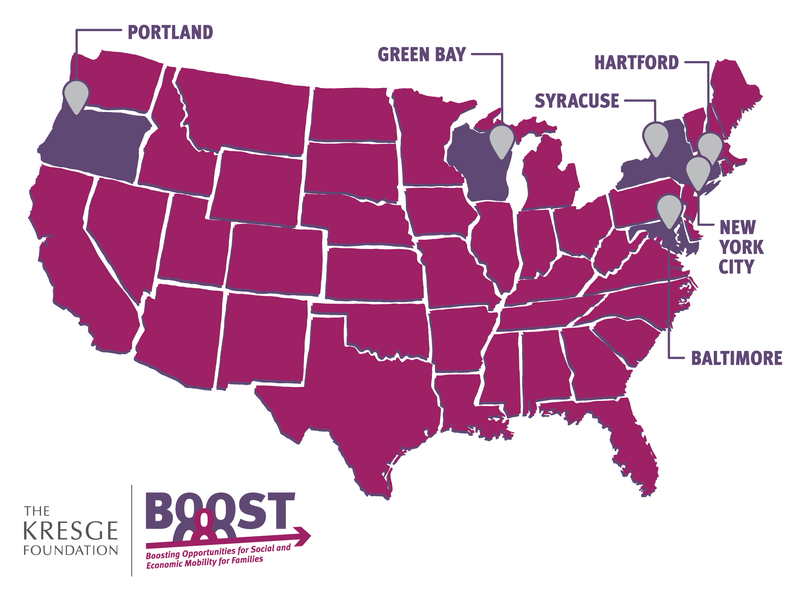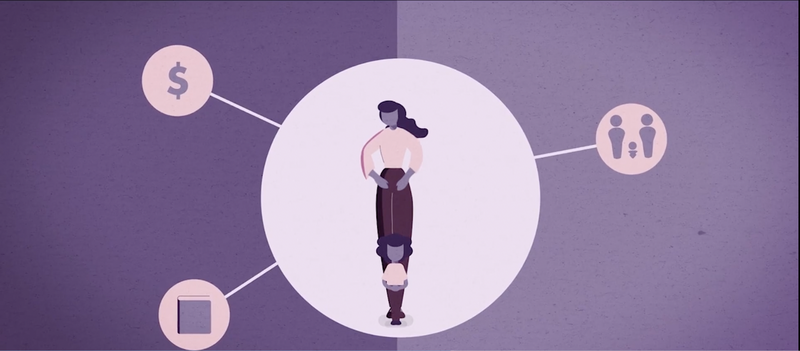
Early Observations from Community College and Human Services Partnership
June 7, 2022
Introduction
BOOST supports partnerships between community colleges and human services nonprofits in six cities nationwide to connect people with low incomes to critical human services and educational pathways that help them climb the social and economic ladder. Its core tenets are social and economic mobility, career pathways, partnership, learning, two-generation approaches, racial equity, and sustainability. In this blog, Jobs for the Future (JFF) will look at the approach, development, and tools used by BOOST partnerships to build a shared understanding of partnership, drive operational systems change, and spur program advancement.

Aligning Resources Through Data Sharing Among BOOST Partners
Partnerships between community colleges and human services organizations are essential in ensuring families a pathway to economic mobility, mainly through the disruptions of COVID-19. Over the past two years, six BOOST cities have developed and shaped the components needed for strong partnerships that support pathways to family economic mobility. While we explore the findings from some of the BOOST learning sites in this blog, the video below dives a bit deeper into all six sites.
Human services organizations and community colleges often support the same families, but may not coordinate to align resources. This challenge can limit the resources and services that students and families receive on their road to social and economic mobility, and often cause families to navigate a large amount of information that can be duplicative.
Two BOOST partners encountered this issue before the BOOST project in Green Bay: Northeast Wisconsin Technical College (NWTC) and Forward Service Corporation (FSC), a multi-service organization supporting families with career advancement, education and training, and financial support. These organizations have worked together for more than 15 years to serve families with low incomes in Green Bay. Participants from FSC who had enrolled at NWTC were working towards self-sufficiency but were still in need of “life happens” resources and not just academic resources. FSC and NWTC did not have a way to communicate these needs so that students did not have to tell their stories repeatedly, and so the partners worked together to provide support and case management to their clients. It was often difficult for both organizations to identify these shared clients. Additionally, FSC case managers who knew clients took classes at NWTC were unsure of their clients’ experience and academic progress.
The Green Bay BOOST partners advocated for increased access and transparency through data sharing to better track, assess, and support families. The partners are now better informed about how to best support economic mobility for families. The real-time data sharing allows NWTC staff and FSC case managers to work collaboratively to meet the needs of students and their families. Each partner can see referrals and information that students have received, and can support students for success and economic mobility.
Organization and System Change
It can be challenging for organizations to support their clients when they’re unaware of their progress, needs, or academic standing. Human services organizations often lack access to students’ academic progress, and community colleges tend to be unaware of the external programs or services their students participate in. As part of the Green Bay partnership’s work to improve transparency and information sharing, NWTC allowed FSC case managers limited access to use its student success database, Starfish, to support BOOST clients and families.
In addition to the shared data system, the partners developed articulation agreements to award college credit for three out of the four certificates offered at FSC. The five-year memorandum of understanding includes a clause that allows students who completed any of these certificates from 2019 to be eligible for credit at the technical college. This provides a career pathway for many students by making the technical college’s opportunities to advance students’ career paths more accessible.
Human services organizations and community colleges often support the same families, but may not coordinate to align resources. This challenge can limit the resources and services that students and families receive on their road to social and economic mobility.
Shared Understanding Through Partnership
Partnerships between community colleges and human services organizations provide families with complete access to various resources. Some of these resources—for example, school supplies or career coaching—may not be available at one of the entities. That’s where the partnership is essential.

In Baltimore, the BOOST partnership is between Baltimore City Community College (BCCC) and the Center for Urban Families (CFUF), a human services nonprofit focused on strengthening urban communities by helping fathers and families achieve economic stability. Through the partnership, BCCC provided GED classes onsite at CFUF, and members completed occupational training in health care, human services, cybersecurity, transportation, logistics, and others. CFUF assigns case managers to BOOST students to help remove barriers. It also makes tutors available. The partners work together to ensure students are employed in their fields of expertise upon program completion.
To help address issues like food and housing insecurity, CFUF members receive intensive case management and support through the BOOST partnership. CFUF also provides supplies and uniforms and has a loaner laptop program for its students. By incorporating family voices in its program model, the partnership has heard from its students and families in the Baltimore communities about the importance of child care. As a result, CFUF has focused on providing free child care for members and has been working to identify local child care providers for future partnerships to create a sustainable solution. Meanwhile, BCCC provides the technical training needed to access jobs leading to family economic mobility. This combination of services and support is essential for helping CFUF members achieve their goals.
CFUF and BCCC worked closely together during the planning period to select career pathways based on labor market information; map out the program and implementation frameworks; discuss processes and potential outcomes for Baltimore BOOST; troubleshoot challenges; examine progress; and plan for future opportunities. Each entity used its strengths to support family economic mobility.
Program Advancement and Sustainability
Client feedback allows BOOST partners to refine their program designs in order to serve students better and advance family economic mobility. Incorporating feedback loops and collaborative data review indicates where there is room for improvement and where there are opportunities for scale and sustainability.
In Queens, the BOOST partnership is between LaGuardia Community College and Commonpoint Queens. Commonpoint Queens provides a local, on-the-ground link to meet people where they are and provides a connection to LaGuardia Community College. This project advances racial equity by extending access to occupational training and employment to English language learners through a sequential and integrated bridge model that combines English language classes with training and internships to prepare participants for careers as community health workers. In addition to increasing access to careers, the project supports much-needed diversification of the public health workforce. The partnership provides contextualized English support for multilingual participants, evening classes for adult students, and on-campus child care. The partnership has helped LaGuardia Community College and Commonpoint Queens design more accessible programs that meet people’s needs and career goals.
The project team for Queens meets monthly to identify adjustments needed for its Bilingual Community Health Worker program. This involves data reviews, progress assessments, and feedback discussions with students, business partners, and other stakeholders. Queens also collected surveys from its first program cohort to learn more about their experiences and explore opportunities to better serve their clients and families. Those improvements have been built into subsequent cohorts. Queens intends to continue incorporating participant feedback to ensure the program meets clients’ needs.
BOOST Queens also built on its partnership by expanding efforts beyond the BOOST project. It is working to develop other shared programs and has formed joint grant proposals to sustain the collaboration. LaGuardia now has a better referral system with Commonpoint Queens for other training programs, and the partners are actively strategizing and collaborating for future opportunities. They have also created new scholarship opportunities for adults across different continuing education programs that will last beyond the BOOST project. In addition, LaGuardia’s five-year strategic plan prioritizes strengthening community partnerships like BOOST. The more connected these organizations are, the easier it is to operate as one coordinated system rather than as individual institutions.
The partnership has helped LaGuardia Community College and Commonpoint Queens design more accessible programs that meet people’s needs and career goals.
Takeaways
These early observations from the BOOST partnerships highlight an opportunity for community colleges and human services organizations to align resources to better support their clients. BOOST encouraged human services entities and community colleges to begin working together when strategizing innovative practices. For community colleges and human services organizations seeking to strengthen family economic mobility, the early lessons learned from BOOST provide some first steps:
- Ensure ongoing communication that focuses on strengthening the partnerships between the organizations to create a lasting partnership that better serves families in the community.
- Begin by identifying partners that serve the same target population(s).
- Create clear channels of communication between the identified partners.
- Build time and space for potential partners to learn about each other’s goals, programs, and services.
- Elevate and center the whole family’s current academic, career, and basic needs.
- Harness each organization’s strengths to serve each need.
- Include ways to capture ongoing participant feedback and constantly utilize the information to improve the program.
- Lean into opportunities to innovate and make system changes that will genuinely benefit families.
- Cross-train and understand each partner’s mission, language, and context.
- Troubleshoot challenges, discuss progress, and plan for future opportunities.

Taking the Long View: Designing Pathways for Economic Mobility
JFF embraces the tenets of the BOOST initiative to help community partners build long-term pathways grounded in real people and real places to help learners launch careers.

Guided Career Pathways Framework
Dramatic disruptions in our labor market and economy require a responsive and dynamic model for postsecondary education. The lines between learning and work are fading as people find that they must continually develop new skills…

Student Success Center Network (SSCN)
This national network scales proven practices to help more than 4.5 million students earn credentials that lead to well paying jobs. Nearly half of U.S. community colleges are connected to the Student Success Center Network.…
